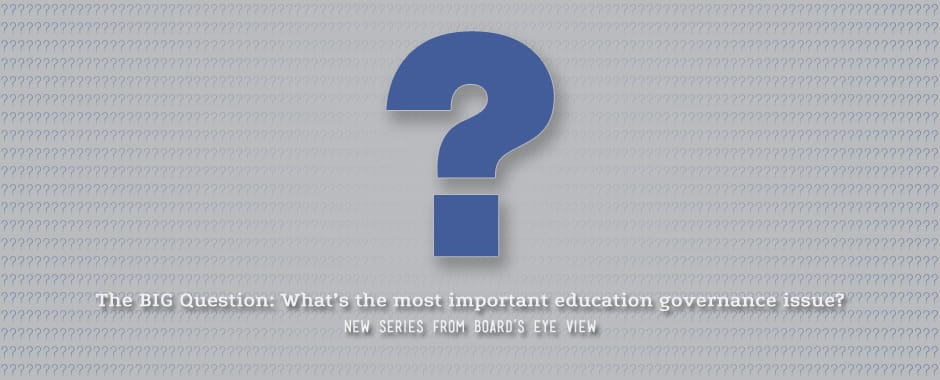This is my first post in two months and I must thank the contributors to TBQ (The BIG Question) for keeping the governance issues on the front burner in my absence (more on what I was doing “on sabbatical” in subsequent Board’s Eye View posts). We had a wonderful group of contributors, from arch reformer Jay Greene to arch establishmentarian Anne Bryant. Michelle Rhee wrote, as did John Chubb, Harold Kwalwasser, David Harris, John Kirtley, Tim Kremer, Darrell Allison, Mark Anderson, and Robyne Camp. It’s an impressive group of people who think hard about the mechanisms of education governance.
 Read all the TBQ essays. |
Camp, who just lost a tight re-election race for the board in her small Westchester County, NY, district, offers a fascinating perspective on school reform, suggesting that reform may be harder for the rich. “Education reform here in the leafy suburbs,” she concludes, “will have to trickle up from New York City’s poorest schools.”
Tim Kremer, who directs the New York State School Boards Association, is a steady advocate of local control, suggesting that “many boards have a healthy dose of skepticism about grand, top-down initiatives such as Race to the Top, Common Core Standards and the new Annual Professional Performance Review or APPR.” But he offers a much needed shout-out in support of the reform intentions of those top-down initiatives, proposing that “student-centered, forward-thinking, intelligent school board leadership has never been more in demand.”
The head of the National School Boards Association, Anne Bryant, is equally pro-reform—“there is a need for testing and a need to hold teachers and schools accountable for student progress,” she writes—but she also thinks “we’ve gone too far” on testing and “rote memorization.”
My friend Hal Kwalwasser, whose new book Renewal: Remaking America's Schools for the 21st Century, which has just been published (and which I helped edit), offers a strong defense for schools districts as the governance organization to keep—and improve on.
For better or worse, it is the school district, not the national or state governments, that delivers education to this nation’s students. How we handle those districts, in all their variations, is fundamentally important to getting our education policy right in the 21st century.
From the trenches, Bronx special education teacher Mark Anderson notes that “it’s rare that content knowledge, pedagogical wisdom, or other experiential knowledge is transferred between classrooms, let alone between schools or between districts.” What’s missing, he says, “at all levels, is genuine dialogue grounded in the professional experience of the classroom.”
If we could marry such local level governance ideas—that schools and school districts become more empowered through dialogue and leadership—with the free market governance mechanisms of choice advocates like Kirtley, Rhee, Harris, Allison, and Greene…. Well, we could be on to something.
Empowering parents is what drives Darrell Allison, who is President of Parents for Educational Freedom in North Carolina, and John Kirtley, a former equity firm manager who now administers tax credit scholarships for 40,000 low income Florida children. Such scholarships not only give parents a choice, says Kirtley, the program “encourages the creation of powerful coalitions for choice that don’t exist with partial measures.” Allison finds it “totally unacceptable” that “50 percent of poor elementary and middle school students passed state tests” despite North Carolina’s spending $35 billion on education over the last five years. This is why Allison’s group is lobbying for a tax credit program in the Tar Heel State. (Robyne Camp has an interesting dissent about parent engagement and school boards, suggesting that parents may not be the best equipped advocates for sensible reform at a policy or pedagogical level.)
Parent control has been one of the fundamental principles of Jay Greene’s writing for years, but his TBQ essay suggests a pragmatic political compromise. “I have no particular love for local school districts,” he writes, but “they just more closely approximate parental choice and control than does granting more power over education to the state or national governments.”
John Chubb, a member of the Hoover Institution Koret Task Force on K-12 Education, takes aim at one of the most disruptive innovations in school governance since the printing press: the computer. (Sorry, but television, that “vast wasteland,” never revolutionized the classroom.) And Chubb poses the essential questions, for which we are frantically searching for answers:
States must now ask a historic governing question: Should local boards continue to control student access to instruction on the Internet? Or should the state exert its authority and govern Internet access itself?
Finally, David Harris, who helped Indianapolis mayor Bart Peterson turn that city into a capital of choice, and Michelle Rhee, the one-time lightning rod superintendent of Washington, D.C., offer brilliant reform ideas from their new perches: Harris as founder and CEO of The Mind Trust, and Rhee as founder and CEO of StudentsFirst. Rhee, as the name of her new organization suggests, believes that if we “put student needs at the center of decision-making in our schools,” the rest will follow:
I can’t point to any one policy that is responsible for holding our kids back. But I can assure you that there is an overall approach to education policymaking that is hurting children. And that is this: Too often decisions are made and policies are set based on the interests of adults in the system rather than student needs.
While Rhee’s organization has spread the net wide and is now working on reform legislation in more than a dozen states, The Mind Trust goes a mile deep, focusing its considerable reform heft at Indianapolis, recruiting “proven programs” to the city and “incubat[ing] life-changing schools and initiatives” that has, Harris says, “sparked a robust community conversation” about school reform and has attracted great new education leadership to his city.
Each of these essays provides important and nuanced information to the question of how we can best govern our public education system; together, they are not a bad blueprint for systemic reform.
Thanks again to our TBQ contributors.
